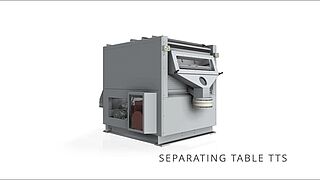TTS - Separation of non-ferrous metals
No rubbish is good rubbish
The amount of household waste per capita in Germany in 2019 was 457 kilograms. The total volume of waste in Germany in 2018 was over 417 million tonnes (source: destatis). Waste disposal companies and the circular economy are working on concepts and technologies for the best possible recovery of these quantities. In terms of a cascade of waste, the best garbage would of course be the one that does not arise in the first place. Thus, waste avoidance is actually the top priority. Then comes reuse and recycling. In fourth place is e.g. energy recovery in waste incinerators (especially EfW plants). And the final solution is disposal, which is more like disappearing into landfills. Landfilling of untreated waste has been banned in Germany since 2005.
Burn, Baby, Burn: Energy recovery in incinerators
In a certain way, incinerators provide recycling material after processing municipal waste. Valuable metals can be found in the residues, incinerator bottom ash (IBA). With todays raw material prices for copper, brass & Co., they are worthwhile to recover. In addition to iron, ash from incinerators contains non-ferrous metals such as copper, zinc, lead and brass but also stainless steel and light metals such as aluminum. The 68 German waste incinerators use their annual capacity of over 20 million tonnes. Around a quarter of the input is left over as IBA, which contains 7 to 10 % metals.
Ash as a base
What happens to ash from waste incinerators? First of all, for the above-mentioned reason, it should be ensured that everything valuable is efficiently extracted from the ash. This is done by crushing, screening and separating the ash. Systems from TRENNSO-TECHNIK® are recommended for the optimal classification of non-ferrous metal slag. The slag enters the sorting process as dry bulk material. IBA can be used in various construction applications e.g. in road construction as a so-called secondary aggregate. IBA can also be found as a secondary aggregate in the substructure of buildings.
Gold digging 2.0: sieving and separating non-precious metal slag
It's somewhat of gold diggin when our systems, configured primarily from screening technology and density sorting technology, are used for the separation of non-ferrous metal slag. Whereby it's more than just hoping to find what you are looking for. The success is obvious, on the sieve and separating table. The non-ferrous metal slag was separated from the rest of the ash in advance, using a non-ferrous metals separator.
The first stage for classifying non-ferrous metal slag is our SIK screening machine. This screening machine from TRENNSO-TECHNIK® screens non-ferrous metal slag e.g. from 0 to 25 mm grain size. The classification takes place step-by-step in stages on TTS separation tables from TRENNSO-TECHNIK®, e.g. about 4-8 mm, 2-4 mm and 0-2 mm as in the video. Non-ferrous metal and light metal are now going separate ways. Additional magnets can be integrated into the system in order to sort out still existing FE parts (iron).
The processing of ash naturally is a dusty affair. Therefore, the entire process takes place under controlled suction.
Grateful environment: recovery of non-ferrous metals
There are several good reasons for recovering non-ferrous metal from municipal waste and the resulting ash. In addition to the value of the metals extracted, resource conservation is particularly important. The increased use of recycled non-ferrous metals immediately protects the environment, since the corresponding primary production of these metals is no longer necessary. This contributes to significant carbon savings. TRENNSO-TECHNIK® has included the efficient focus on sustainability in its values. This is exactly what comes into play here. Every system and machine from TRENNSO-TECHNIK® does its part to protect resources and thus our environment. All the more so because our systems work with a dry separation process and do not use water as a medium.
Inquiries about sorting technology? Call TRENNSO-TECHNIK®!
If you have any inquiries about sorting technology such as our screening technology or density sorting technology, we would be happy to provide you with information about our machine portfolio. Special feasibility inquiries can actually be carried out through tests in the TRENNSO-TECHNIK® technology center in Weißenhorn. After making an appointment in advance, our trained team in the technology center is happy to help you.
We look forward to your task: Tel. + 49-7309-9620-0




